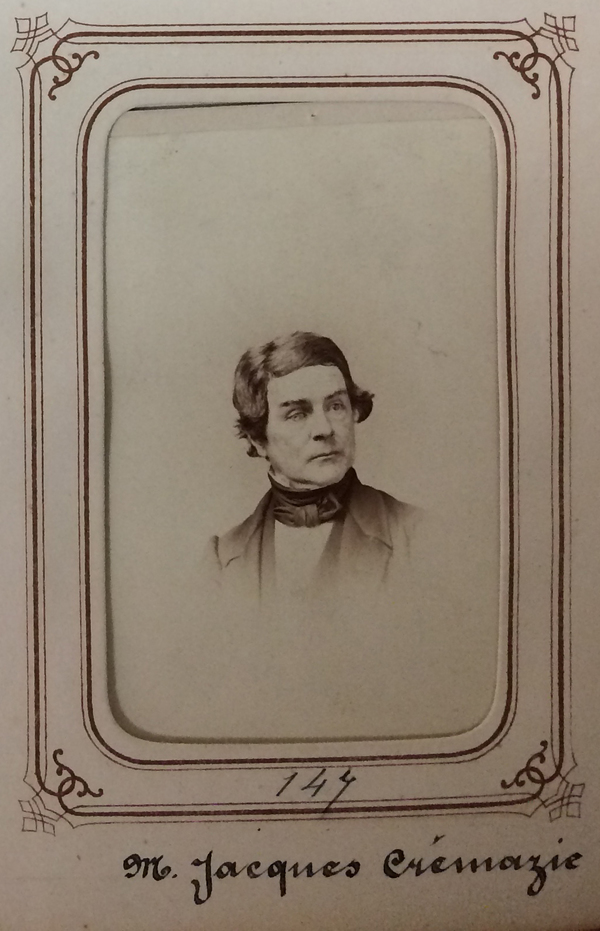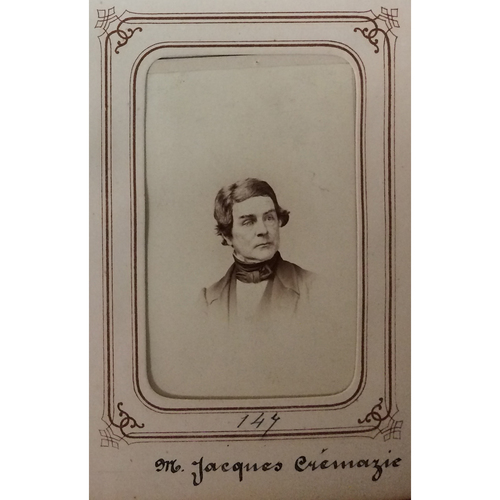
Source: Link
CRÉMAZIE, JACQUES, lawyer, author of lawbooks, journalist; b. 10 Oct. 1810 at Quebec, of the marriage of Jacques Crémazie and Marie-Anne Miville; eldest brother of the poet Octave Crémazie whom he helped considerably with his financial difficulties and during his exile; d. 11 July 1872 at Quebec.
In 1818 Jacques Crémazie entered the Petit Séminaire of Quebec, where he completed his classical studies in 1828. After thinking for some time of becoming a priest, he studied law, and on 4 Feb. 1835 was called to the bar. He practised his profession for some years with Jean-Baptiste-Édouard Bacquet. On 26 April 1845 he was appointed inspector of the registry offices, in the districts of Quebec and Gaspé; these offices had been created in 1841, by a decree of the Special Council, for the registration of acts and particularly mortgages on real estate in Canada East, and government-appointed inspectors were responsible for maintaining efficient operation.
When the faculty of law was opened in 1854, shortly after the founding of the Université Laval, Jacques Crémazie became its first secretary and taught civil law there. In 1866 he succeeded Augustin-Norbert Morin* as dean of the faculty, a post which he held until his death and which made him a pioneer in French Canada in the teaching of law at a university. In 1860 he was appointed also recorder of Quebec City.
Having a keen interest in primary instruction, Crémazie submitted to the Legislative Assembly’s committee on the state of education in Canada East, set up in 1853, an important document which prompted the committee’s report and the educational reforms of 1856. Crémazie considered that the backwardness of education in Canada East resulted chiefly from “the failure to take any steps to train teachers, and to establish and fix at a proper rate the salary which should be granted to them.” He called for the setting up of normal schools. Crémazie found other causes of backwardness, in the lack of uniformity in teaching, the endless variety of school texts, and the absence of any supervision of the schools. He asked that the state, through a ministry of public instruction, intervene to determine salaries, publish a journal, and concern itself with all problems of education. When the Council of Public Instruction was formed in 1859, he became a member of it. Ten years later the council was reorganized, and he was appointed chairman of the Catholic committee. He was also secretary of the Catholic School Commission of Quebec City. He was a man of great charity, and paid particular attention to the Asile du Bon-Pasteur at Quebec. He even gave lessons to the teaching sisters and to poor pupils, and acted without payment as the community’s legal councillor.
Jacques Crémazie published three works: in 1842, Les lois criminelles anglaises . . . , the first compilation in French outlining criminal law as it applied in the Province of Canada; in 1852, Manuel des notions utiles sur les droits politiques, le droit civil, la loi criminelle, et municipale, les lois rurales, etc.; and in 1867, Notions élémentaires de cosmographie et de météorologie accompagnées de leçons sur l’usage des globes. The first two do not display great originality of thought, but they served a useful purpose at the time by diffusing legal knowledge among French-Canadian readers. The third work shows that the author was interested in all subjects; it was composed chiefly to be of assistance to teachers. Crémazie edited L’Ami de la religion et de la patrie, a paper published by Stanislas Drapeau* from 18 Dec. 1847 to 13 March 1850. It appeared weekly, then twice and finally three times weekly. It styled itself “ecclesiastical, political and commercial,” and its aim was to help develop popular instruction. This newspaper was replaced by L’Ordre social, which appeared from 28 March to 26 Dec. 1850 and which was also directed by Crémazie. He wanted to complete as a journalist the work he was doing as an educator, by defending what he regarded as the “eternal values of civilization,” religion, property, and family.
After an illness of several months, Jacques Crémazie, a bachelor, died on 11 July 1872. The next day Le Canadien wrote: “A great Christian and a distinguished citizen has just died.”
Jacques Crémazie, Les lois criminelles anglaises, traduites et compilées de Blackstone, Chitty, Russell et autres criminalistes anglais, et telles que suivies en Canada: arrangées suivant les dispositions introduites dans le Code criminel de cette province par les statuts provinciaux 4 et 5 Victoria, chap. 24, 25, 26 et 27; comprenant aussi un précis des statuts pénaux de la ci-devant province du Bas-Canada (Québec, 1842); Manuel des notions utiles sur les droits politiques, le droit civil, la loi criminelle, et municipale, les lois rurales, etc. (Québec, 1852); [Jacques Crémazie], Notions élémentaires de cosmographie et de météorologie accompagnées de leçons sur l’usage des globes (Québec, 1867).
L’Asile du Bon-Pasteur de Québec d’après les annales de cet institut (Québec, 1896), 132–37. Canada, Province of, Legislative Assembly, Journals, 1852–53, app.J.J., “Education, Lower Canada: report of the superintendent of education. . . .” Le Canadien (Québec), 15 juill. 1872. Le Courrier du Canada (Québec), 12 juill. 1872. Annuaire de l’université Laval pour l’année académique 1873–74 (Québec, 1873), 51–55. Beaulieu et Hamelin, Journaux du Québec, 175–205. Audet, Histoire du conseil de l’Instruction publique, 40–41. André Labarrère-Paulé, Les instituteurs laïques au Canada français, 1836–1900 (Québec, 1965), 156–61. P.-G. Roy, A propos de Crémazie (Québec, 1945). 17–28.
Cite This Article
J.-C. Bonenfant, “CRÉMAZIE, JACQUES,” in Dictionary of Canadian Biography, vol. 10, University of Toronto/Université Laval, 2003–, accessed February 9, 2026, https://www.biographi.ca/en/bio/cremazie_jacques_10E.html.
The citation above shows the format for footnotes and endnotes according to the Chicago manual of style (16th edition). Information to be used in other citation formats:
| Permalink: | https://www.biographi.ca/en/bio/cremazie_jacques_10E.html |
| Author of Article: | J.-C. Bonenfant |
| Title of Article: | CRÉMAZIE, JACQUES |
| Publication Name: | Dictionary of Canadian Biography, vol. 10 |
| Publisher: | University of Toronto/Université Laval |
| Year of publication: | 1972 |
| Year of revision: | 1972 |
| Access Date: | February 9, 2026 |



